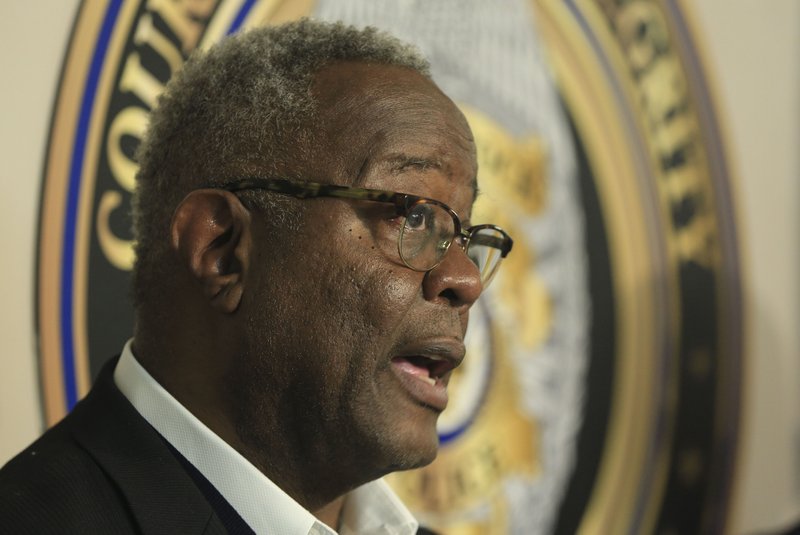Little Rock Police Chief Keith Humphrey has fulfilled a promise four months in the making.
At Attorney General Leslie Rutledge's eighth annual Never Forgotten discussion in July, Humphrey met family members of missing children and adults. One family member asked Humphrey whether the parent or loved one of a missing person had ever spoken to the department or its recruits.
"I can't tell you that we've done that in the past," Humphrey said. "But ... I can tell you that as of July 18, 2019, the Little Rock Police Department will make plans to do that. That's a promise."
Colleen Nick, an activist for missing children who is the executive director of the Morgan Nick Foundation, spoke to a group of recruits and seasoned officers Friday about the effect a missing child or loved one has on a family, a community and on law enforcement authorities. That conversation was a direct result of the Never Forgotten seminar in July, Nick said.
"I think it opened our eyes professionally and personally," said Brittany Gunn, sergeant over the Violent Crimes Unit in the Little Rock Police Department's Major Crimes Division. "The majority of us have children, and we put ourselves in [the families'] shoes. Professionally, it makes us want to continue working hard."
Approximately 40 officers gathered at the training center Friday to hear Nick's presentation.
"They brought quite a few people over, but I talked mainly to the recruits," Nick said. "They're the generation that's going to change the face of this missing person epidemic. They're getting the training at the base level."
Nick's foundation, named after her 6-year-old daughter who was abducted from an Alma ballpark in 1995, provides immediate assistance for the families of missing people, advocates for legislation regarding missing people and teaches free safety-skills classes for families.
Nick, who works for the National Criminal Justice Training Center and with the National Center for Missing and Exploited Children, said she also has spoken to multiple law enforcement agencies in an effort to help officers understand the needs of a family and a community after a person disappears. Nick said she spoke about what the family expects of law enforcement authorities, how to talk to a family in the midst of a crisis and what to expect.
"If you have a worst-case scenario -- a case like Morgan's -- it will literally rip the fabric of your community, and they have to be ready before that starts," Nick said. "The family is thinking about the possibilities. Law enforcement is thinking about the probabilities. The family is putting a great deal of faith in law enforcement."
Nick said that though she initially addressed her talk to the recruits, older officers spoke with her afterward.
"Multiple seasoned officers in the room came up to me after and said, 'It was really good to hear you,'" she said. "They said, 'We are taught to compartmentalize so we can address these kinds of things. When we compartmentalize, we forget it's OK to feel, and we need to feel this in order to fight for these children.'"
Gunn said Friday that the conversation was part of the many changes going on in the department's missing persons investigations.
When Gunn was promoted to sergeant over violent crimes in the summer, she asked the detectives there to follow up on older cases to clear out any that could be considered resolved.
"I really didn't like the way we were handling missing persons and runaways reports," Gunn said. "I wanted us to change some things to maybe get them out of the system and bring closure to the families."
Sometimes family members change phone numbers, making it difficult for police to contact them regarding a missing person. Sometimes the missing person returns, and family members forget to inform officers. In many cases, when the individual disappeared, the Police Department did not have the resources it has now.
Through Gunn's initiative, detectives began ensuring that all outstanding missing-person cases had been properly logged in an online database for missing people and unclaimed or unidentified bodies. Detectives also got back in touch with older missing-person cases and cleared out those in which the person should no longer be considered missing.
Detective Randy Dearing said the Police Department gets approximately 700 to 800 missing-person cases a year, but the vast majority of those are quickly resolved. In July, the department had 96 missing-person cases that had not been cleared. Gunn began the initiative in September, and by Friday the department had approximately 40 outstanding cases.
Dearing said the department also has partnered with the Morgan Nick Foundation. The foundation's case managers will act as a go-between for families and investigators in some ongoing cases.
"Sometimes it's easier to talk to a civilian as opposed to a police officer, and it definitely helps us with caseload management," Dearing said.
Nick said it's important for investigators to have time to focus on each family's case. Even in long-term missing-person investigations, she said, the dedication of the investigator is crucial.
"For our family, we're very fortunate that our law enforcement is so incredible and continues to fight for Morgan," Nick said. "A lot of families may not have that. When someone remains missing long term, it's open-ended grief. ... Our search for Morgan, even though it's 24 years old, it's still going."
Metro on 11/28/2019
